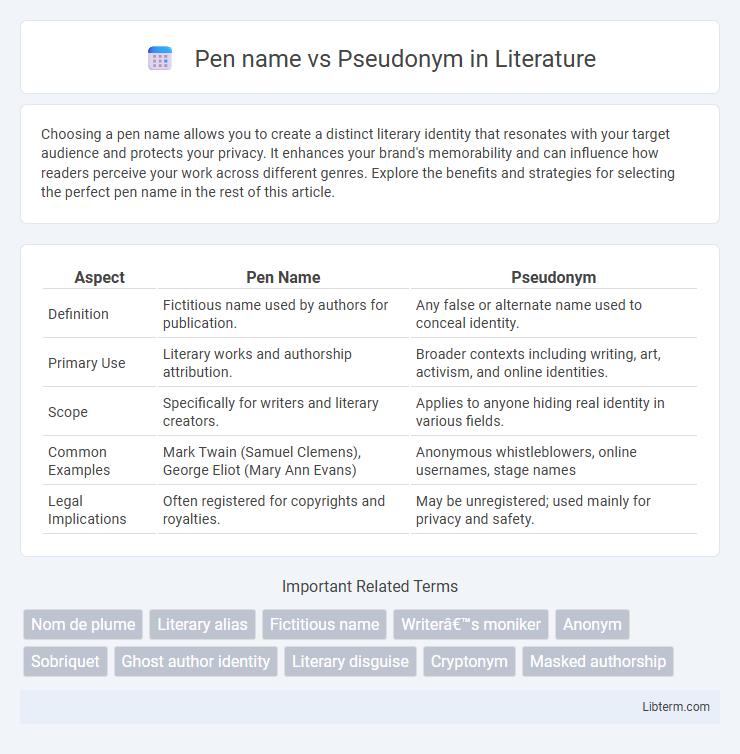Choosing a pen name allows you to create a distinct literary identity that resonates with your target audience and protects your privacy. It enhances your brand's memorability and can influence how readers perceive your work across different genres. Explore the benefits and strategies for selecting the perfect pen name in the rest of this article.
Table of Comparison
| Aspect | Pen Name | Pseudonym |
|---|---|---|
| Definition | Fictitious name used by authors for publication. | Any false or alternate name used to conceal identity. |
| Primary Use | Literary works and authorship attribution. | Broader contexts including writing, art, activism, and online identities. |
| Scope | Specifically for writers and literary creators. | Applies to anyone hiding real identity in various fields. |
| Common Examples | Mark Twain (Samuel Clemens), George Eliot (Mary Ann Evans) | Anonymous whistleblowers, online usernames, stage names |
| Legal Implications | Often registered for copyrights and royalties. | May be unregistered; used mainly for privacy and safety. |
Understanding Pen Name and Pseudonym: Key Definitions
A pen name is a fictitious name an author uses to publish work, often chosen to maintain privacy or create a distinct literary identity. A pseudonym extends beyond writing and includes any assumed name used by individuals in various contexts, such as performers or online personalities. Understanding the difference is crucial in distinguishing literary branding from broader identity concealment or artistic expression.
Historical Overview: Origins of Pen Names and Pseudonyms
Pen names and pseudonyms originated as early as ancient times, with writers adopting alternate names to conceal identity or avoid persecution; for example, Roman poet Catullus used pseudonyms for privacy. In medieval Europe, pseudonymous authorship became common among religious and political figures to protect themselves from retribution. The 18th and 19th centuries saw a surge in pen name usage by female authors like Mary Ann Evans (George Eliot) to bypass gender biases in publishing.
Why Writers Choose Pen Names vs Pseudonyms
Writers choose pen names primarily to create a distinct literary identity, maintain privacy, or target a specific audience, while pseudonyms often serve broader purposes including anonymity, protection from persecution, or rebranding across different genres. Pen names are commonly used in fiction and entertainment, emphasizing marketability and brand consistency, whereas pseudonyms can encompass any alias adopted for non-professional or protective reasons. Understanding these distinctions helps clarify motivations behind name changes in literary contexts.
Legal Implications: Copyright and Identity
Pen names and pseudonyms both serve as alternative names for authors, but their legal implications differ significantly. Copyright laws recognize the true identity behind a pen name, allowing authors to claim ownership and control over their works, while pseudonyms may complicate copyright registration and enforcement if the real identity remains undisclosed. Identity protection varies as pen names typically connect to the author's legal identity for contracts and royalties, whereas pseudonyms offer anonymity but can pose challenges in asserting legal rights and proving authorship.
Famous Authors: Pen Names and Their Stories
Famous authors often use pen names or pseudonyms to maintain privacy, create distinct literary identities, or experiment with different genres, such as Samuel Clemens writing as Mark Twain and Mary Ann Evans as George Eliot. These pseudonyms not only protect the author's real identity but also sometimes become more famous than the authors themselves, influencing literary history and reader perception. Notable examples include J.K. Rowling's use of Robert Galbraith for crime novels and Stephen King's alias Richard Bachman to test his works' reception without the influence of his established fame.
Pseudonyms in Different Genres: Fiction, Nonfiction, and Beyond
Pseudonyms are widely used across various genres to create distinct author identities, with fiction writers often adopting them for privacy or genre-specific branding. In nonfiction, pseudonyms can protect the author's privacy or lend authority in sensitive subjects, while beyond traditional books, pseudonyms appear in journalism, blogging, and online content creation to manage personal or professional boundaries. This strategic use of pseudonyms helps authors navigate diverse audiences and market demands while maintaining control over their public persona.
Cultural and Gender Perspectives on Name Choices
Pen names and pseudonyms often reflect cultural and gender dynamics, where writers adopt alternative names to navigate societal expectations or biases. In many cultures, female authors historically used masculine pen names to gain acceptance and avoid gender discrimination, illustrating gendered power structures in literature. The choice of a pseudonym also serves as a cultural tool for identity negotiation, allowing writers to conceal ethnicity or cultural background in contexts of prejudice or censorship.
Marketing Strategy: Pen Name vs Pseudonym for Branding
Using a pen name allows authors to craft a unique and memorable brand identity that resonates with target audiences and enhances marketability. A pseudonym extends beyond authorship to encompass artists and creators, offering flexible branding opportunities that can diversify product lines and expand audience reach. Strategically selecting either a pen name or pseudonym influences consumer perception, enabling tailored marketing campaigns and stronger brand differentiation in competitive markets.
Privacy, Anonymity, and Author Protection
A pen name is primarily used by authors to maintain privacy and create a distinct literary identity, shielding their real name from public exposure. A pseudonym extends beyond writers, offering broader anonymity that protects individuals across various professions from unwanted recognition or scrutiny. Both serve as crucial tools for author protection, enabling control over personal information and mitigating risks related to reputation, safety, and intellectual property rights.
Choosing the Right Name: Factors and Best Practices
Selecting the right pen name or pseudonym involves evaluating factors such as target audience, genre, and privacy preferences to enhance author branding and marketability. A pen name typically serves literary purposes and can create a distinct persona aligned with the writing style, while a pseudonym might also be used for anonymity or professional separation. Best practices include researching existing names to avoid confusion, ensuring easy pronunciation and memorability, and considering legal implications to protect the chosen identity.
Pen name Infographic

 libterm.com
libterm.com